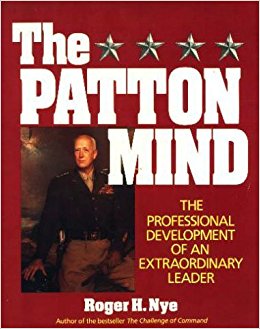[The Fatten Mind: The Professional Development of an Extraordinary Leader, by Roger H. Nye (Wayne, NJ: Avery Publishing Group) 224 pp., $12.95]
The perfect gift for the armchair warrior. The Patton Mind traces the intellectual development of a “profane man of action” who, Roger Nye notes, “left behind the most complete record of exhaustive professional study of any World War II general—or any general in American history, for that matter.” Dyslexic as a child, Patton was the beneficiary of parents who continually read to him from the classics, ancient history, and Romantic poetry. He developed a prodigious memory, which undoubtedly helped nurture his sense of destiny, his belief in reincarnation, and hence his fearlessness. To perish bravely, like a legendary hero, was glorious, marking not the end of life, but an entry into Valhalla before one was reborn to take up the shield and sword once more. The Patton Mind is, in essence, a survey of the books that shaped and justified Patton’s thinking. Patton disdained intellectuals, but he was a voracious reader of military history, biography, and tactics. The professional soldier had, in Patton’s words, to “be so soaked in military lore that he does the military thing automatically.” And though he said bluntly that soldiers were “killers,” he was a good deal less bloodthirsty than some politicians. For all his aggressive fire, Patton was shot through with a famous religious sense and believed in victory with magnanimity, not retribution, and in targeting enemy soldiers for destruction rather than their cities and civilians.
—H.W. Crocker III

[James B. Conant: Harvard to Hiroshima and the Making of the Nuclear Age, by James Hershberg (New York: Alfred A. Knopf) 948 pp., $35.00]
The career of Harvard President James B. Conant (1933-1952), chemistry prodigy and godfather to the A-bomb, refutes H.L. Mencken’s opinion that a university president of “real intelligence” was as “improbable as a Bach festival in Mississippi.” Among the first of the modern university presidents who prefer to be knee-deep in much that has little to do with university life, the professor who began his presidency by carving out time to teach undergraduates soon found more important things to do, especially when it came to lecturing government officials on the evils of everything from communism to the H-bomb. Called to Washington in 1941 to help pave the road to Hiroshima, he never quite lost his attraction to the corridors of power. An Eisenhower Republican before Eisenhower Republicanism existed, Conant was never quite at home in Harry Truman’s Washington; a Cold War liberal, he was never at all comfortable in what he feared was becoming Joe McCarthy’s America. But he was just as much a politician as the above three, and the bulk of James Hershberg’s monumental biography details Conant’s political life. Whether the issue was atomic policy or McCarthyism on campus, Conant invariably tried to find a way to claim the moral high ground and save his presidential hide and enhance his national reputation. Hershberg spends literally hundreds of pages exploring the twists and turns of Conant’s mind as he wrestled with the consequences of the Manhattan Project before aligning himself with those who proposed to “ban the [H-] bombers.” He accords somewhat less space to Conant’s mealymouthed efforts to uphold academic freedom while appeasing his conservative board of overseers. One can only shudder at the prospect of the pusillanimously platitudinous President Conant bending before the politically correct McCarthyites of today.
—John C. Chalberg

Leave a Reply